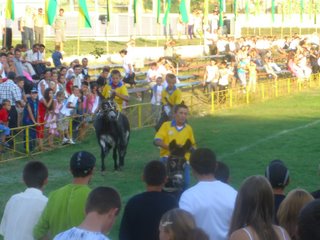First, a moment of silence for the passing of Captain America, my favorite comic book hero. Apparently, he was shot and killed a couple weeks ago (although how many times have comic book heros come back from beyond?) For those who don’t know, Captain America started out as a fairly scrawny lad, unfit for military service during WWII. But, he had heart, and so volunteered to test a special “super soldier serum.” The serum gave him super strength, and he went on to have many adventures attempting to do what most superheroes do, save the world.
The way Captain America got his start is, in my opinion, a bit silly – nothing more than glorified steroids. I stopped collecting comic books when I was about 13, and I can’t say I’m any kind of expert concerning Captain America or that I’ve kept up with his exploits as of late, but I always liked him for his unbending idealism and honesty. He was a real straight shooter, in contrast to other, perhaps more questionable heroes/vigilantes like the Punisher or Wolverine who tended to meat out justice with a heavy hand. Even Captain America’s “weapon,” an indestructible shield which he could throw like a boomerang, was essentially a defensive instrument that could be used offensively when necessary. In a world of gray Captain America was about as close to white as comic book heroes come, and I, for one, will miss him. When I get home, I’ll have to dig out some old comics and relive a bit of my childhood.


Anyway, this blog is supposed to be about my Peace Corps experience, so let’s get to that. Now that the weather is getting warmer and the earth is less frozen, a lot of digging is going on. My host-brother, Vitalik, dug a new toilet and covered up the old, full one. People are planting potatoes and onions in their gardens, and trimming grape vines to encourage new shoots. One of the schools here dug a new well, and I helped out a little one day. These projects are basically carried out with a shovel, bucket, and a rope – very different from the mechanized digging of wells in America. At the school, how many people showed up to help struck me. A few of the workers were being paid, but many were simply the fathers of school children who wanted to make things better for their own. I admire that.
March 8th marked Women’s Day. This is similar to the American Mother’s Day, except that it’s for all women. I had a great time at a concert held in one of the school auditoriums. The local dance troupe performed several times and lots of people sang. The singing is a neat experience because everyone in the audience seems to know all the words to these folk songs. I’d imagine it would be like in America if we all sang “This Land is Your Land” or “Home on the Range.” But I just don’t think we have that sort of culture. Oh yeah – I also got up to sing. There were performances in Russian, Gagauz, and Romanian, so I started out by saying that as March 8th is an international holiday, it was only fitting that there be a performance in English as well. I then proceeded to introduce the audience to the wonder that is The Stray Cats’ “Rock This Town.” I think everyone got a kick out of it, and the whole concert, including my performance, has been replayed several times on the local TV channel.
Bryan and Amy came to Copceac for the weekend to run another of our small business Poosk seminars. Since it was on my turf, I was responsible for all the logistics. I was really worried that all the kids who had signed up to attend wouldn’t show, but on our first day we actually had well more than I had anticipated – actually it made the seminar a bit difficult to conduct with so many people in the room. But, fortunately (???) we had the typical attrition rate so days 2 and 3 were a bit more manageable.

Participants this time came up with creating a movie theater, a pizzeria, and a gym. I thought all of them were good ideas, though each needed to be a little clearer or do a little more research regarding their projected budgets. Nonetheless, the fact that they’re simply making budgets BEFORE beginning a project puts them well ahead of their peers and even some NGO directors. [One such director from another part of Moldova refuses to make a budget for a remodeling project because he/she claims that the costs can only be known once the project is complete.]
This seminar was the first time that Bryan, Amy, and I gave real feedback to students on their presentations and awarded a prize to the group that did the best job. In the past, we simply asked questions as a way to expose weaknesses in the presentations because we didn’t want to offend or discourage participants. Ultimately, we decided that the educational value was worth it – if we don’t flat out tell these students things like (a) not to look at only one person during a presentation, (b) not to have your back to the audience when presenting, or (c) that their budgets are unrealistic, who will?
I really liked having guests at my house, and look forward to an upcoming shared birthday party with Bryan and Amy. Coincidentally, the only three PCVs living in Gagauzia, who happen to be the same three PCVs who run Poosk, also happen to have their birthdays on April 13, 19, and 23. Small world.











